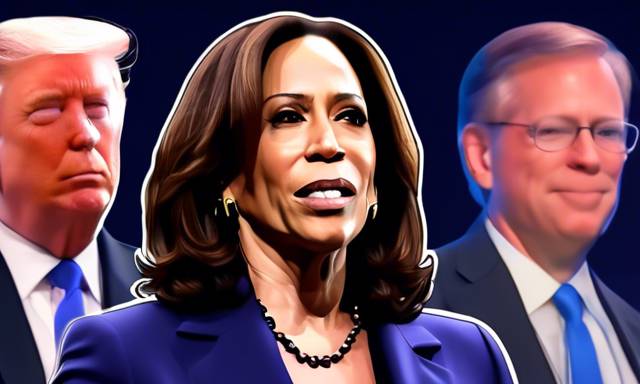The Intersection of Politics and Crypto: A Unique Collaboration
Have you ever thought about how the world of cryptocurrencies can intertwine with the big leagues of politics? It’s fascinating, right? Just picture it – a former senior aide to Donald Trump, Anthony Scaramucci, teaming up with none other than Vice President Kamala Harris to shape cryptocurrency policies. It sounds like the plot of a political drama, but it’s actually happening! This unexpected partnership could signal some intriguing shifts in how crypto might be officially perceived in the U.S.
Why This Matters
Let’s start by breaking down why this collaboration is so significant. Over the past few years, cryptocurrencies have evolved from being considered a fringe or speculative asset into a cornerstone of modern finance. Many of us have seen the headlines – Bitcoin hitting all-time highs, the explosive growth of decentralized finance (DeFi), and even the development of central bank digital currencies (CBDCs). This isn’t just a fad; it’s a revolution, and it’s grabbing the attention of both Wall Street and Washington.
When you think about it, having someone like Scaramucci involved in crypto policymaking is quite a statement. He’s not just any political figure; he has a background in finance and has been vocal about the potential of cryptocurrencies. His track record includes a quick but memorable stint as the White House Communications Director, and now, he seems to be using his influence to bridge the gap between government policy and burgeoning crypto technologies.
The Hearts and Minds of Investors
For many potential investors, understanding the regulatory landscape is crucial for decision-making. A supportive regulatory framework could mean safer investment environments and potentially higher adoption rates of digital currencies. This isn’t just your everyday news; this could shape the landscape of investment opportunities. Imagine crypto finding its way into retirement funds or being broadly accepted in everyday transactions!
- Here are a few key takeaways about why this collaboration matters for investors:
- Regulatory Clarity: With political figures like Scaramucci and Harris discussing policies, we could see clearer regulations that can guide investors.
- Increased Legitimacy: Having established political voices involved lends legitimacy to cryptocurrencies, making them more attractive to mainstream investors.
- Potential for Growth: Supportive policies could lead to increased innovation, creating new opportunities in the crypto space.
Real-Life Impact: What Could Happen?
Let’s consider how this partnership might play out in real life. Imagine if we have clearer guidelines around the use of cryptocurrencies for transactions. This means more businesses might start accepting Bitcoin or Ethereum, making that talk of buying your morning coffee with crypto a reality. I can already envision it: standing in line, proudly taking out my phone to pay with digital assets while the barista looks bewildered (but secretly impressed) at my cutting-edge payment method.
But then, there’s the flip side. What if these policies come with strict regulations? The debate over whether the government should have a hand in controlling aspects of crypto could lead to some heated discussions. After all, one of the core appeals of cryptocurrencies is their decentralized nature.
Finding Common Ground
One of the most heartening aspects of this collaboration is that it showcases a willingness to find common ground. Political landscapes are often polarized, but cryptocurrency can hold the potential to unite various factions. Investors from every spectrum – whether you’re a die-hard Bitcoin enthusiast or more skeptical of blockchain tech – can benefit from clearer regulations and a stable market.
I once attended a conference where a panel discussed the future of finance. The room was filled with techie innovators alongside traditional bankers. The vibe was electric! All these different perspectives coming together over coffee (and maybe a few passion-fueled debates), just like what we might see with Scaramucci and Harris, is what innovation often requires.
So, What’s Next?
As we delve deeper into this unexpected partnership, it raises an important question for all of us: How do we feel about the role of government in cryptocurrency? Is it something that should remain outside their control, or can we find a balance where regulation brings both safety and progress?
It’s a topic worth reflecting on, especially as we consider our own roles as investors or enthusiasts in this rapidly evolving landscape. What do you think? Is a little government oversight the key to the future of cryptocurrency, or does it threaten the very essence of what crypto stands for?
Let’s keep the conversation going!
Sources:





 By
By
 By
By
 By
By

 By
By
 By
By